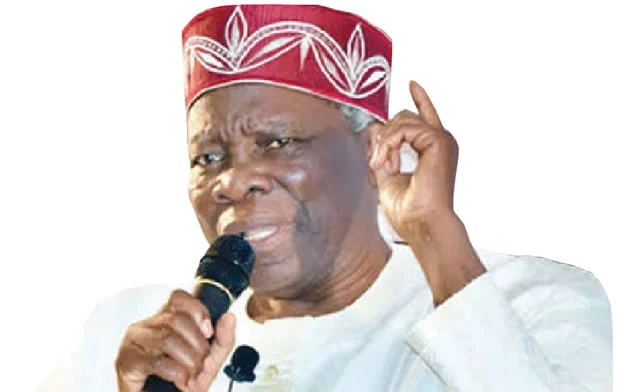Leader of Yoruba Nation self-determination struggle, Prof. Banji Akintoye, yesterday, apologised to victims of Trans-Atlantic slave trade in Yoruba land by appealing to the Almighty to heal the region of the consequences of their harrowing curses placed on the land. He said some of the victims during their ordeals in those days placed severe curses on the present and future generations of Yoruba people, over the unholy collaboration between few leaders of the race then with the Portuguese and Dutch businessmen, who came to Africa to buy slaves in the 18th Century. Akintoye, in an open letter to the Yoruba people, which he personally signed, said he had the inspiration that the spirits of those sold into slavery for peanuts to the Portuguese and Dutch people are behind the lack of growth, development, progress, peace and unity in Yoruba land and among the Yoruba people. Akintoye lamented that documentations from multiple reports indicated that over one million Africans, including Yoruba people, were exported to Europe and America as slaves by Europeans, who brought salt in exchange for slaves to Africa, through the collaboration of some local warriors. According to him, “the curses placed on the Yoruba people by victims of the Trans-Atlantic slave trade, many of whom jumped into the Atlantic Ocean during their forced trips to Europe and America, need to be cleansed for the Yoruba people to enjoy God’s favour, cohesion, unity and progress. The letter reads: “Dear Yoruba people, my name is Professor Banji Akintoye. This letter comes to you as an overdue apology from the several generations of the Yoruba race that are dispersed around the world. This is not an ordinary letter; it is an epistle borne out of deep revelation and shared by many children of God of Yoruba extraction all over the universe. “Predating colonialism and slavery in Africa in the 18 and 19 centuries, the Yoruba race had engaged in internal conflicts, resulting in marauding, intra-tribal and internecine warfare. Historians mostly agree that such civil unrests did not result in commercialisation of human captives until the era of colonialism and slave trade on the African soil. Yet, we have to agree that foreigners did not do this without the cooperation of some of the indigenous people, the Yoruba. “According to the revelation referenced above, a segment of the captive Yoruba sons and daughters hauled into slavery looked back and placed a curse on the land and the people that violated their humanities by selling them into slavery. Furthermore, Holy Spirit revealed that some among the Yoruba captives committed suicide by jumping off the captive ships into their deaths deep into the Atlantic Ocean, while others simply placed the curse and endured the shame by continuing the captive’s journey. For this, the need for reconciliation and unreserved apologies is real and past due. “Against this backdrop of atrocity of historical proportions unleashed against the peoples of Black Africa, which escalated into the full-blown slavery, the current generation of the Yoruba seeks to tender an unreserved, heart-felt apology on behalf of our past generations of forefathers, monarchs and chiefs who participated in slavery.”
, those who folded their hands in helplessness and hopelessness, those who looked the other way when they could have spoken or stood against the perpetrators of this heinous crime against humanity, and those who cooperated and/or benefitted from the sales of their brothers and sisters, children, parents, friends and neighbours. “Words alone cannot atone for the immeasurable amount of suffering endured by our brothers and sisters during the forceful passages into the New World as they entered the narrow passage that ushered them into the journey of no return. Yet, words have to be offered to express remorse, regret and above all, to ask for forgiveness that could only come from the heart, and straight from the throne of grace. “In all reality, a crime half a millennium old may seem forgotten and forgettable, perhaps it may even be misconstrued as negligible and perceived as having outlived the statute of limitation; yet, as the Yoruba often say in the context of their indigenous rhetoric, “The one who passed feces to mess up the path may forget, but the one who had to clean up the mess will never forget.” Even if the smell is gone, the thought of the blemish and inner violation may linger. “Having said all that, we say it from the bottom of our hearts that we sincerely understand if you still nurse the hurt and feel the pain; after all, years may heal the wound, but the scar may always remain. All we can say is to appeal that you please forgive our forefathers on whose behalf we tender these apologies; and to forgive us as offspring of our erring progenitors. “May God bless you, lighten your burdens, redeem time for you and generations to come after you and heal our land. Above all, may the Lord of the Universe forgive the Yoruba race and move it into a new dispensation in its onward march towards the attainment of redemption and enjoyment of its potential, Amen.”

